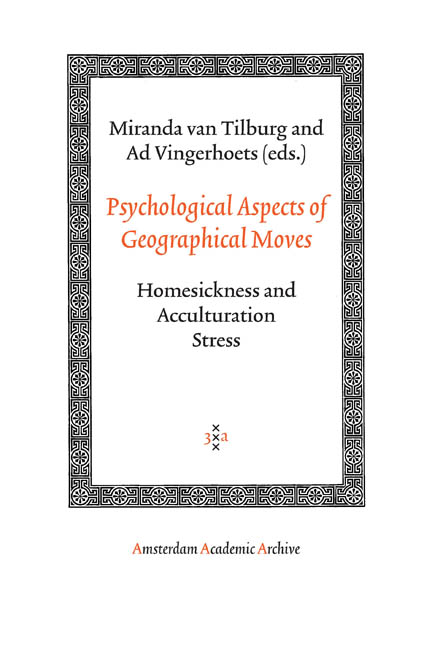Book contents
- Frontmatter
- Preface
- Contents
- Contributors
- 1 The Homesickness Concept: Questions and Doubts
- 2 Culture Shock, Homesickness, and Adaptation to a Foreign Culture
- 3 The Psychological Context of Homesickness
- 4 Geographical Moves and Psychological Adjustment
- 5 Homesickness and Acculturation Stress in the International Student
- 6 Psychological and Psychosocial Adjustment of Migrants: Families in a Changing Environment
- 7 Individual Differences in Acculturative Stress Reactions: Determinants of Homesickness and Psychosocial Maladjustment
- 8 The Cry for the Lost Placenta: Cultural Bereavement and Cultural Survival among Cambodians who Resettled, were Repatriated, or Stayed at Home
- 9 Children's Coping with Homesickness: Phenomenology and Intervention
- 10 Homesickness after Relocation during Early Adolescence
- 11 Personality, Temperament, and Homesickness
- 12 Homesickness, Personality and Personality Disorders: An Overview and Therapeutic Considerations
- 13 Health Issues in International Tourism: The Role of Health Behavior, Stress and Adaptation
- 14 Development of Psychopathology in International Tourists
- Miscellaneous Endmatter
6 - Psychological and Psychosocial Adjustment of Migrants: Families in a Changing Environment
Published online by Cambridge University Press: 23 January 2021
- Frontmatter
- Preface
- Contents
- Contributors
- 1 The Homesickness Concept: Questions and Doubts
- 2 Culture Shock, Homesickness, and Adaptation to a Foreign Culture
- 3 The Psychological Context of Homesickness
- 4 Geographical Moves and Psychological Adjustment
- 5 Homesickness and Acculturation Stress in the International Student
- 6 Psychological and Psychosocial Adjustment of Migrants: Families in a Changing Environment
- 7 Individual Differences in Acculturative Stress Reactions: Determinants of Homesickness and Psychosocial Maladjustment
- 8 The Cry for the Lost Placenta: Cultural Bereavement and Cultural Survival among Cambodians who Resettled, were Repatriated, or Stayed at Home
- 9 Children's Coping with Homesickness: Phenomenology and Intervention
- 10 Homesickness after Relocation during Early Adolescence
- 11 Personality, Temperament, and Homesickness
- 12 Homesickness, Personality and Personality Disorders: An Overview and Therapeutic Considerations
- 13 Health Issues in International Tourism: The Role of Health Behavior, Stress and Adaptation
- 14 Development of Psychopathology in International Tourists
- Miscellaneous Endmatter
Summary
Preface and rational
The actuality and topicality of this paper has been facilitated by the many and often unexpected events and political changes which are taking place at the present time in different parts of the world. The author does not intend to enumerate all of them; however the aftermath of ‘glasnost and perestroyka,’ the unification of Europe in 1992-1994 and the impending changes in South East Asia in 1997 are quoted as examples. The question to be asked is not whether these changes affect the physical and mental health of the world population, but rather to what extent are behavioral scientists, researchers, clinicians and medical specialists ready to meet the changes of this new historical ‘migration of nations’ (Völkerwanderung) and its consequences on the health of individuals and families.
This chapter emphasizes the complexity of contemporary migration research. In a selected review different choices for investigation are presented, namely the biological, psychological and social aspects. The presentation, however, focuses mainly on two specific topics: (a) the process of adjustment of migrant families, and (b) coping of aging migrants with traumatic stressors experienced in the past.
Introduction
Voluntary and forced migration is one of the most permanent themes of human history, which did not lose its actuality with the passing of time. On the contrary, it has become in the twentieth century a major and increasingly demanding central issue facing many governments all over the world.
Some areas of the world have larger populations than they are able to support properly without depriving them of the basic needs of human existence. At the same time, however, many other nations continue to make active efforts to bring people to their area. Their action can be motivated by ideological, political, religious or economic considerations, or, as it often happens, by the combination of some or all the factors mentioned.
People, who are forced or who wish to settle in another part of their country or in another area of the world, present problems, which have attracted growing attention, both nationally and internationally (Cohen, 1981). These problems have become of major interest for psychologically oriented studies of culture-change, which deal with correlations between sociocultural factors and different areas of physical and mental health (Fabrega, 1969; Born, 1970; Brody, 1970).
- Type
- Chapter
- Information
- Psychological Aspects of Geographical MovesHomesickness and Acculturation Stress, pp. 73 - 90Publisher: Amsterdam University PressPrint publication year: 2006

